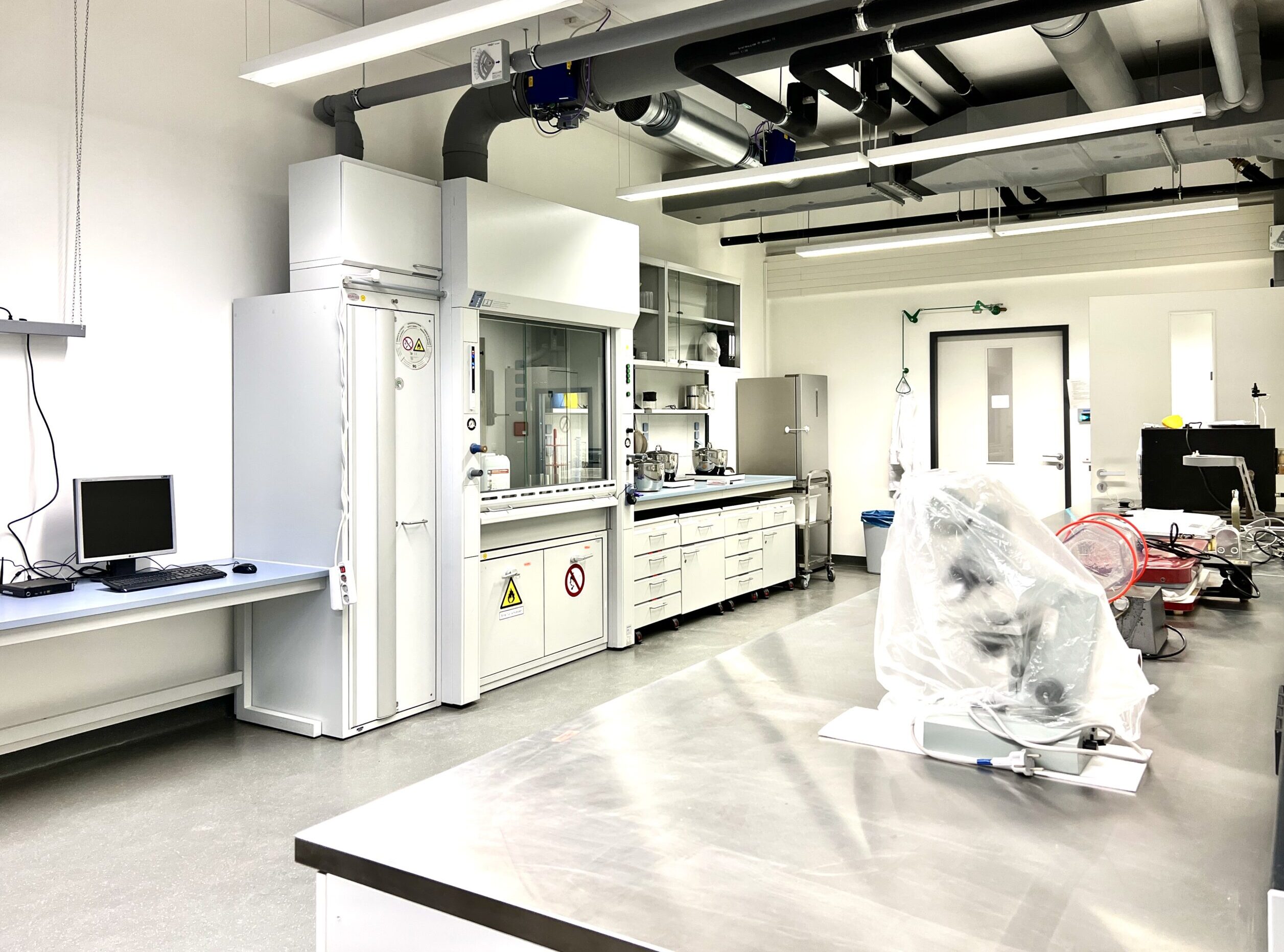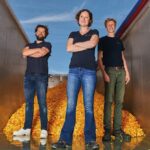Bildnachweis: ScobyTec GmbH.
Leipzig-based start-up ScobyTec produced very thick (approximately 50-mm) non-woven materials from bacterial nanocellulose (BNC), serving as semi-finished goods and staging material for imitation leather, speciality paper, lightweight construction materials and much more. ScobyTec’s innovative materials attracted interest from footwear, automotive and nanosatellite manufacturers and the electronics industry. Numerous industry connections were established, a pilot plant was under construction and the start-up even won a number of innovation awards. Then in the spring of 2023, ScobyTec had to declare insolvency. We talked to Bernhard Schipper, co-founder and product manager of ScobyTec, about what happened and what other bioeconomy start-ups can learn from their experience.
Plattform Life Sciences: Mr Schipper, ScobyTec was one of Germany’s flagship bioeconomy start-ups and has now filed for insolvency. How did it come to this?
Schipper: We often had interest from angel investors. However, most of them underestimated the complexity of our project. What’s more, each business angel had different ideas about markets and business models, consuming a significant amount of time for ScobyTec from the outset. As a result, we turned to institutional funding early on, specifically a programme run by the German Federal Ministry for Economic Affairs and Climate Action (BMWK). However, in retrospect this led to various complications in discussions with quasi-governmental investors. We lacked a sufficient valuation to finance an industrial-scale plant after a BMWK-funded pilot phase. The valuation and the shares claimed by a quasi-governmental investor prevented this. Just before talks collapsed, however, we met a straightforward investor who acted quickly.

So, a last-minute rescue…
Unfortunately, only for 18 months, as our angel investor fell ill in December 2022. At that time, ScobyTec was deeply involved in the pilot project in Leuna, Germany, which started much later than planned and could not be completed in Q4 2022 as scheduled. Due to our investor‘s illness, we could not make an advance payment for the pilot project, putting us in default. However, in Q1 2023, a potential investor from the automotive industry awarded us a development contract that offered us a chance to stay afloat.

Did it work out?
No, because time was already against us. Our pilot project partner could not defer the outstanding payments. Also, the general willingness to invest had declined in 2022. Nevertheless, we pitched our ideas intensively in the DACH region. But when it became clear that we would not make progress in our financing discussions any time soon, we filed for insolvency in April. In May, our investor passed away.
The sudden death of an investor is, of course, an unforeseeable risk. But was this misfortune really just the final straw?
Looking back, we should have halted the pilot project as soon as we were told it would be delayed by a quarter. At the same time, supplier prices soared following the invasion of Ukraine, which had an impact on our planning. So, within the space of a year there were various challenges that forced us to react rather than act. In short, lots of small events mounted up – and threw us into a roller coaster ride. Perhaps it wouldn‘t have been so dramatic if the overall system for bioeconomy start-ups had been more stable.
What do you mean by that?
There are too few early-stage investors in Germany willing to invest in high-risk projects like biotechnology. We soon realised that we needed to scale up, but doing so is very costly and, due to various crises, becoming even more expensive. This also means that start-ups need a lot of staying power and much larger funding rounds. Competitors in North America, for example, can raise much higher sums and can quickly take off and grow. We are a long way off from that in Germany. Quasi-governmental investors are not very flexible regarding financing models and cap tables. Essential intermediate steps in biotechnology, like a pilot project, are challenging to communicate because investors have shorter time frames in mind until profitability is achieved. Many funding programmes do not allow investment in plant technology, which in turn discourages further investors. Most programmes fund service providers, with the funding passed through the start-up. It is also difficult for start-ups to show their own contribution. Moreover, it would be more attractive for investors if there were faster preliminary commitments from state sponsors.

What needs to improve in general to prevent a start-up’s scaling from derailing?
That always depends on the individual situation. In our case, many unfortunate circumstances came together that no one could have foreseen. We also took too long at the beginning to develop a sustainable business model. This was partly because, as a very heterogeneous team, we did not come from biotechnology. Start-ups should not postpone bringing in the expertise they are lacking for too long. Furthermore, planning financing rounds very quickly and in a very targeted manner is crucial – starting with a good cap table. And it is still important to be cautious with potential ‘backers’ who always have their own agenda. Actions in this regard should always be taken from an entrepreneurial perspective. And above all, we believe investors should see themselves as service providers enabling the success of start-ups. Currently there is an unreasonable amount of red tape to get through. It is therefore best to never apply for funding without creating a position for the work this requires. The effort involved in a funding application is very high and blocks further, important scaling activities. As a start-up, you should never engage in price discussions about your product: logically, a new sustainable product is only available vertically at first – meaning it can also be sold as a premium product. It is also crucial to build functioning prototypes for end applications from the outset. Only by doing this can you better understand your product, talk to existing customers using concrete examples and attract new customers.
Where is ScobyTec heading now and what‘s next for you/the company?
ScobyTec GmbH had to file for insolvency in the spring. However, it was clear that we definitely wanted to continue with biotechnology and material development. So we are repositioning ourselves and will acquire the laboratories and the brand. We have also set up a new company for consulting services. Fortunately, we raised our first mini-angel investment in September and have secured orders for new developments and consulting services. We now have to reposition ourselves in the market to become attractive to new investors. We may reintroduce the ScobyTec brand at some point. It isn’t over till it’s over.
Mr Schipper, thank you very much for the interview.
The interview was conducted by Urs Moesenfechtel.
This article was published in the current Plattform Life Sciences issue „Circular Bioeconomy 4_23“, which you can view as an e-magazine via the following link:
https://www.goingpublic.de/wp-content/uploads/epaper/epaper-Life-Sciences-4-2023/#0
Autor/Autorin
Urs Moesenfechtel, M.A., ist seit 2021 Redaktionsleiter der GoingPublic Media AG - Plattform Life Sciences und für die Themenfelder Biotechnologie und Bioökonomie zuständig. Zuvor war er u.a. als Wissenschaftsredakteur für mehrere Forschungseinrichtungen tätig.







